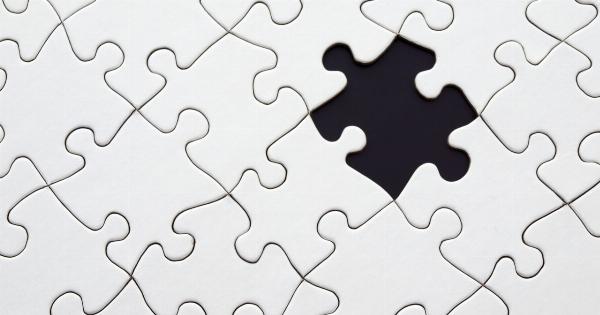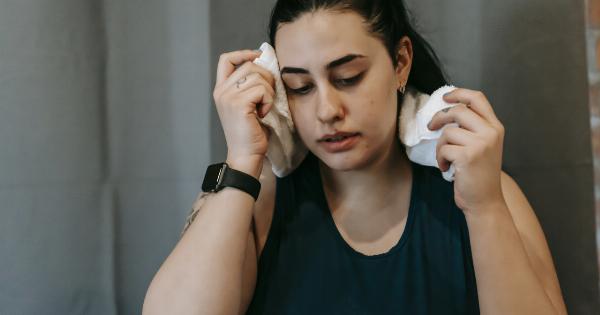Sexual desire, also known as libido, is a natural and essential aspect of human life. It varies between individuals and can change throughout different stages of life.
However, what happens when someone experiences a sudden and unexplained drop in their libido? This can be a distressing and confusing situation, leaving individuals searching for answers and solutions.
Understanding Libido
Before diving into the possible causes and solutions for a sudden drop in libido, it is essential to understand what libido is and how it functions. Libido refers to a person’s overall sexual desire or interest in sexual activity.
It is influenced by various factors, including hormonal, psychological, and physiological factors.
Possible Causes
Several factors can contribute to a sudden drop in libido. Here are some potential causes to consider:.
1. Hormonal Imbalance
Hormones play a crucial role in regulating sexual desire. A hormonal imbalance, such as low levels of testosterone in men or imbalances in estrogen and progesterone levels in women, can lead to a decrease in libido.
2. Psychological Factors
Mental and emotional well-being greatly affect sexual desire. Conditions such as stress, anxiety, depression, and relationship issues can cause a decline in libido.
Additionally, past traumas or negative experiences related to sex can also impact a person’s sexual desire.
3. Medications
Some medications have side effects that can affect libido. Certain antidepressants, antihistamines, blood pressure medications, and hormonal contraceptives may contribute to a decrease in sexual desire.
4. Fatigue and Lack of Sleep
Exhaustion and inadequate sleep can greatly impact libido. When the body is tired and drained, it is difficult for many individuals to engage in sexual activity or feel desire.
5. Lifestyle Factors
Unhealthy lifestyle habits, such as excessive drinking, smoking, and drug use, can lead to a decline in libido. Poor diet, lack of physical activity, and excessive stress can also contribute to a decreased interest in sex.
6. Underlying Medical Conditions
Various medical conditions can affect libido. Chronic illnesses like diabetes, heart disease, and thyroid disorders may cause a drop in sexual desire. Hormonal disorders, such as polycystic ovary syndrome (PCOS) or hypothyroidism, can also impact libido.
7. Age-related Changes
As individuals age, hormonal changes occur that can influence libido. Both men and women may experience a decrease in sex drive as they approach middle age and beyond.
8. Psychological Trauma or Abuse
Past experiences of sexual trauma or abuse can have long-lasting effects on an individual’s libido. The psychological impact of such experiences often leads to a decrease in sexual desire or discomfort in sexual situations.
9. Relationship Issues
Problems within a relationship, such as unresolved conflicts, lack of emotional intimacy, or communication issues, can lead to a decline in sexual desire between partners.
10. Lack of Self-confidence
Self-esteem and body image issues can significantly affect libido. Feeling insecure or unattractive may contribute to a decrease in sexual desire.
Seeking Solutions
Addressing a sudden drop in libido requires identifying the underlying cause. Consider implementing the following solutions:.
1. Consult a Healthcare Professional
If you are concerned about your libido levels, it is crucial to consult a healthcare professional. They can evaluate your overall health, conduct necessary tests, and provide guidance based on your specific situation.
2. Address Underlying Medical Conditions
If a medical condition is causing the drop in libido, it is essential to seek appropriate treatment. Managing and treating conditions like hormonal imbalances or chronic illnesses can help restore sexual desire.
3. Therapeutic Approaches
For psychological causes, therapy can be beneficial. Cognitive-behavioral therapy (CBT), sex therapy, or couples counseling can help address underlying psychological factors impacting libido and improve overall sexual well-being.
4. Lifestyle Changes
Adopting a healthy lifestyle can have a positive impact on libido. Regular exercise, a balanced diet, and sufficient sleep can contribute to overall well-being and promote a healthy sex drive.
5. Communication and Support
If relationship issues are contributing to the drop in libido, open and honest communication with your partner is crucial. Seeking support from a couples counselor or therapist can provide guidance and help both partners navigate sexual challenges.
6. Natural Supplements
Some individuals find relief in using natural supplements that claim to boost libido. However, it is essential to consult with a healthcare professional before using any supplements to ensure they are safe and effective.
7. Stress Reduction Techniques
Managing stress levels through meditation, yoga, deep breathing exercises, or other relaxation techniques can have a positive impact on libido.
8. Self-care and Self-esteem Boost
Focusing on self-care activities and promoting a positive body image can help improve self-confidence and, subsequently, libido.
9. Experimentation and Variety
Introducing novelty and experimentation into intimate experiences can reignite sexual desire. Trying new activities or communication techniques with your partner may help rekindle the passion.
10. Patience and Understanding
Lastly, it is crucial to be patient and understanding with yourself and your partner during this time. A sudden drop in libido is a common issue that many individuals face, and it takes time to address and resolve.
Conclusion
A sudden and unexplained drop in libido can be a challenging situation to navigate. However, with patience, understanding, and the right approach, it is possible to identify the underlying causes and find effective solutions.
Whether it involves seeking professional help, addressing medical conditions, improving communication, or implementing lifestyle changes, taking proactive steps can help restore sexual desire and overall well-being.

























